Propofol-induced changes in neurotrophic signaling in the developing nervous system in vivo
- PMID: 22496799
- PMCID: PMC3319585
- DOI: 10.1371/journal.pone.0034396
Propofol-induced changes in neurotrophic signaling in the developing nervous system in vivo
Abstract
Several studies have revealed a role for neurotrophins in anesthesia-induced neurotoxicity in the developing brain. In this study we monitored the spatial and temporal expression of neurotrophic signaling molecules in the brain of 14-day-old (PND14) Wistar rats after the application of a single propofol dose (25 mg/kg i.p). The structures of interest were the cortex and thalamus as the primary areas of anesthetic actions. Changes of the protein levels of the brain-derived neurotrophic factor (BDNF) and nerve growth factor (NGF), their activated receptors tropomyosin-related kinase (TrkA and TrkB) and downstream kinases Akt and the extracellular signal regulated kinase (ERK) were assessed by Western immunoblot analysis at different time points during the first 24 h after the treatment, as well as the expression of cleaved caspase-3 fragment. Fluoro-Jade B staining was used to follow the appearance of degenerating neurons. The obtained results show that the treatment caused marked alterations in levels of the examined neurotrophins, their receptors and downstream effector kinases. However, these changes were not associated with increased neurodegeneration in either the cortex or the thalamus. These results indicate that in the brain of PND14 rats, the interaction between Akt/ERK signaling might be one of important part of endogenous defense mechanisms, which the developing brain utilizes to protect itself from potential anesthesia-induced damage. Elucidation of the underlying molecular mechanisms will improve our understanding of the age-dependent component of anesthesia-induced neurotoxicity.
Conflict of interest statement
Figures
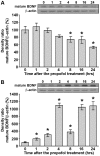

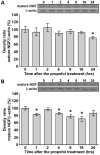
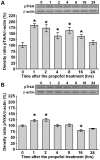
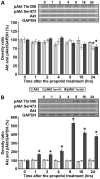
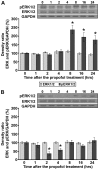
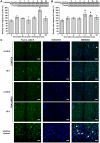
References
-
- Marik PE. Propofol: therapeutic indications and side-effects. Curr Pharm Des. 2004;10:3639–3649. - PubMed
-
- Varju P, Katarova Z, Madarasz E, Szabo G. GABA signalling during development: new data and old questions. Cell Tissue Res. 2001;305:239–246. - PubMed
-
- Fredriksson A, Pontén E, Gordh T, Eriksson P. Neonatal exposure to a combination of N-methyl-D-aspartate and gamma-aminobutyric acid type A receptor anesthetic agents potentiates apoptotic neurodegeneration and persistent behavioral deficits. Anesthesiology. 2007;107:427–436. - PubMed
Publication types
MeSH terms
Substances
LinkOut - more resources
Full Text Sources
Research Materials
Miscellaneous

